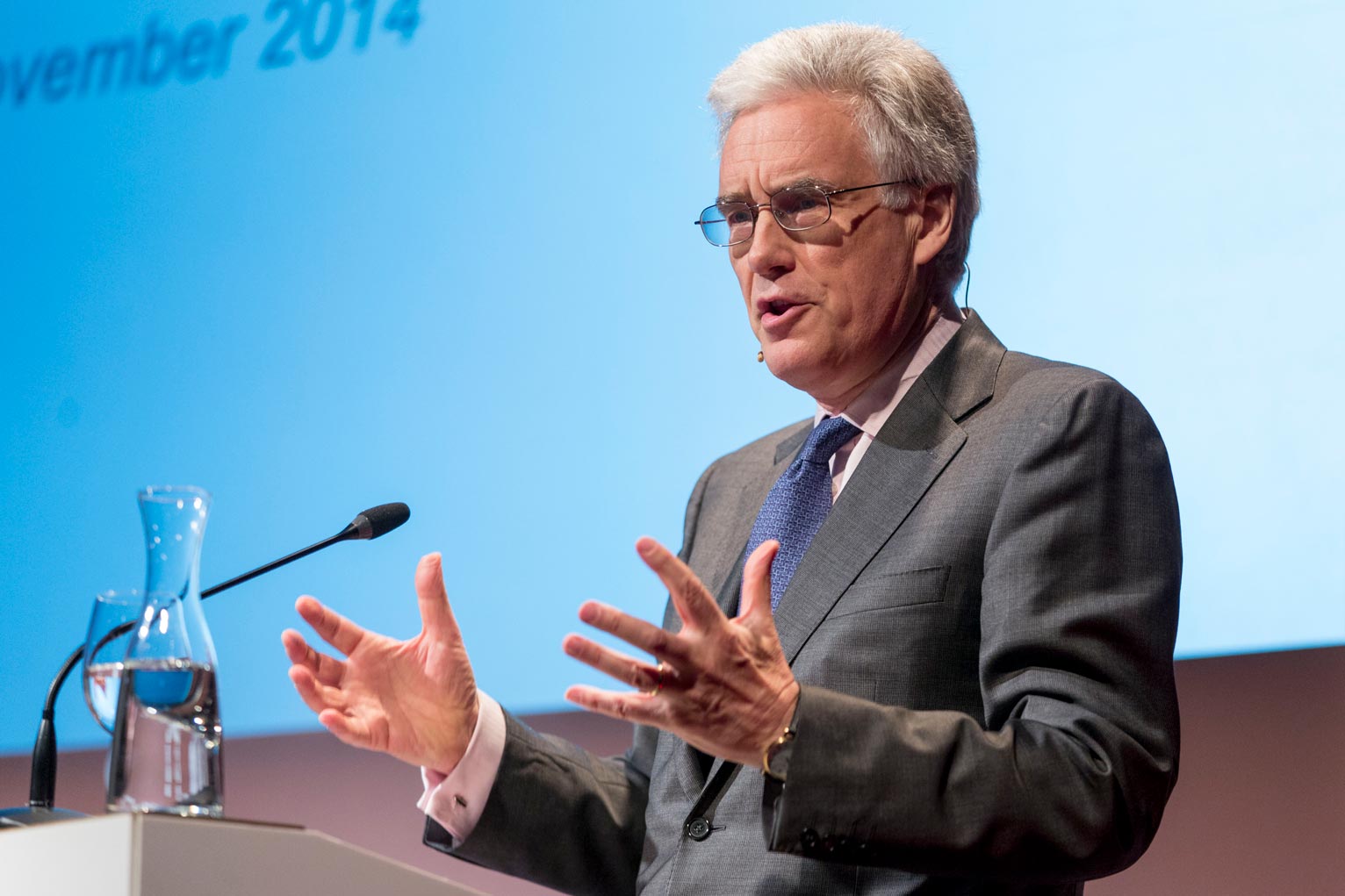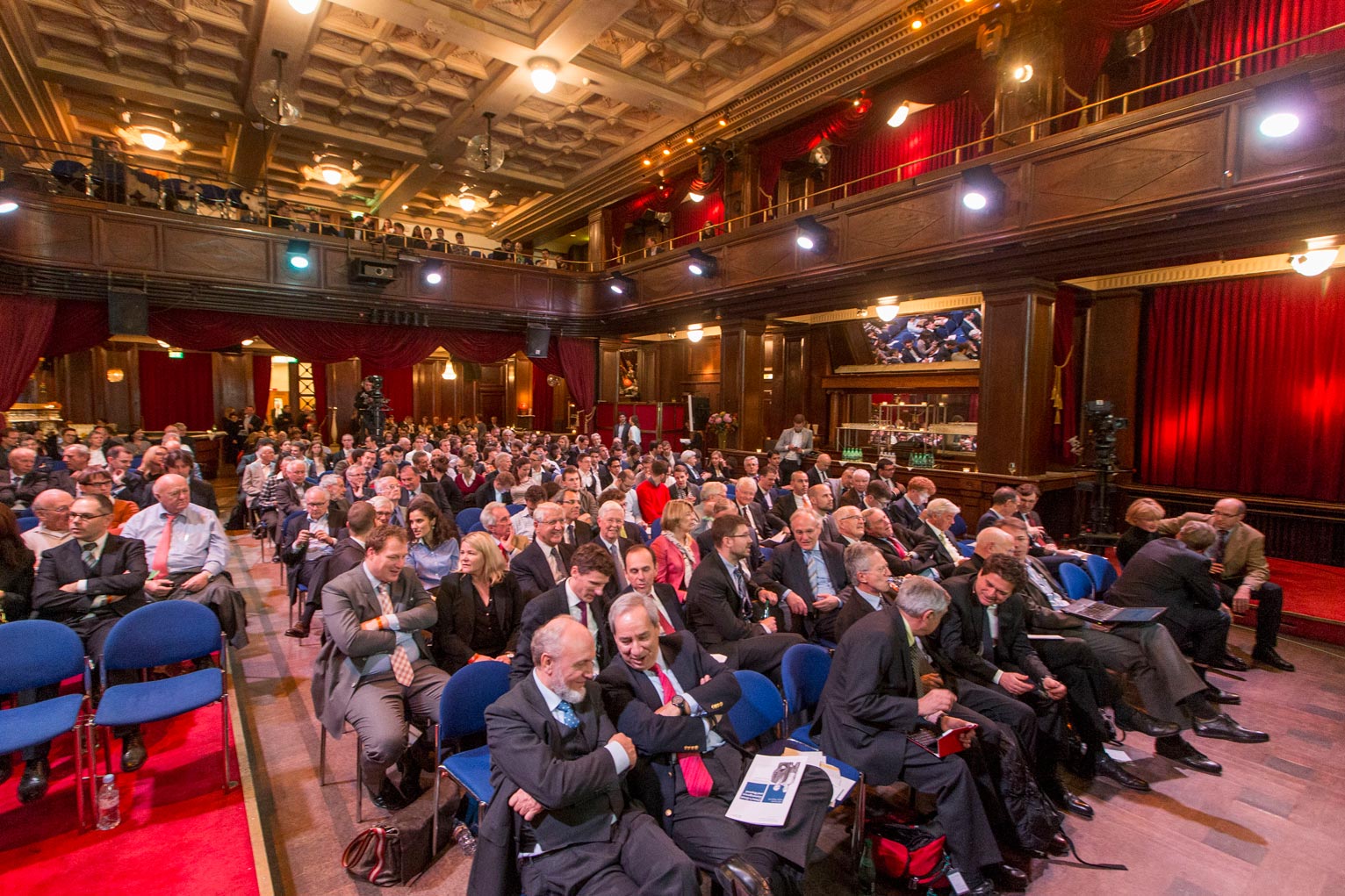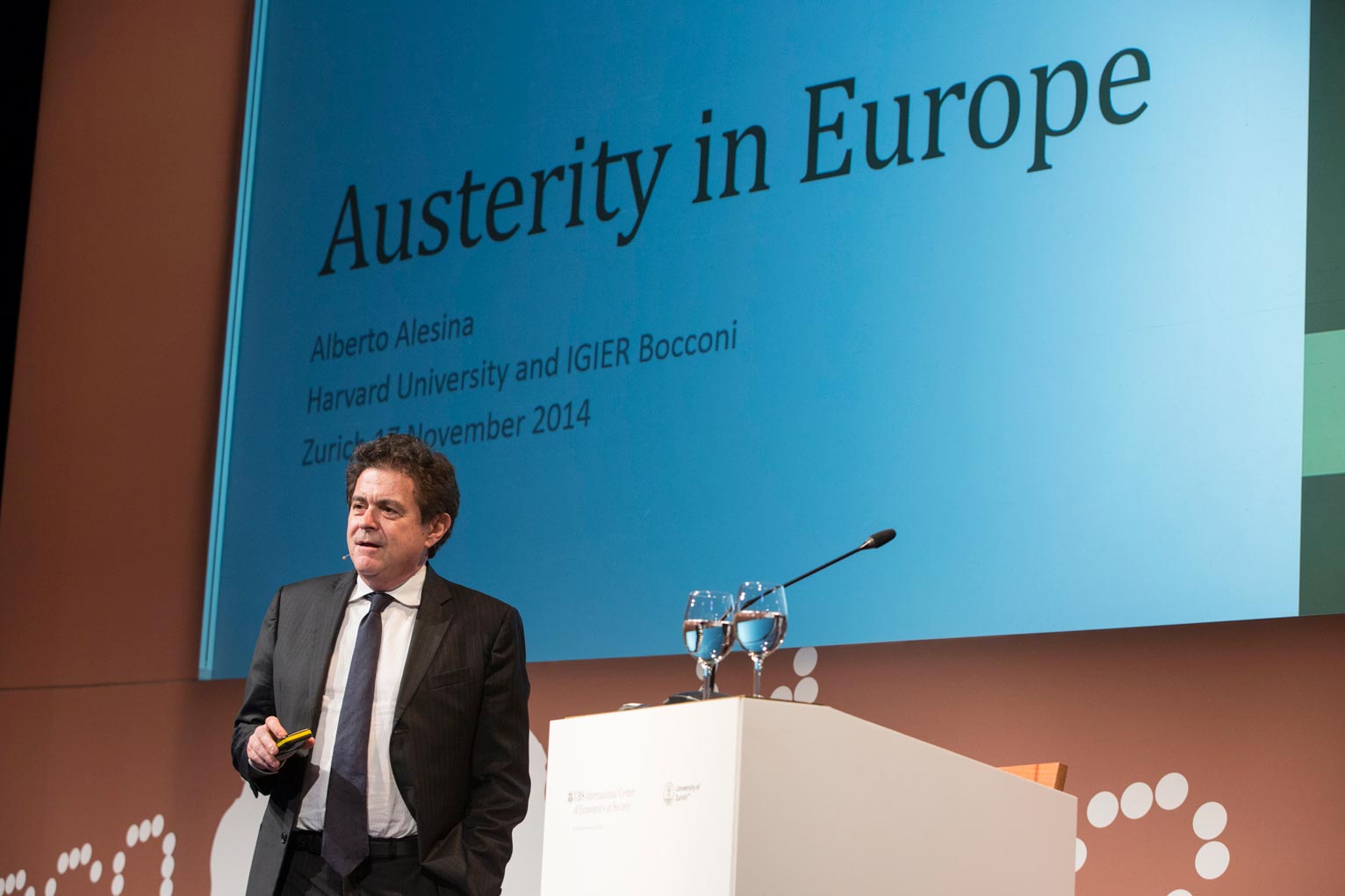The pre-crisis orthodoxy
On November 17, 2014, the UBS Center gathered a prestigious set of international speakers at its annual Forum for Economic Dialogue. Ernst Fehr once more welcomed over 500 guests at the Kaufleuten in Zurich. Leading international figures from science, business, and politics discussed why large parts of the world are still waiting for a return to stable economic growth and a reduction in unemployment and debt levels six years after the outbreak of the financial crisis.
by Maura Wyler
The event started with a keynote lecture delivered by Lord Adair Turner, Member of the House of Lords (United Kingdom). Lord Turner began his speech with a persuasive appeal to challenge key assumptions of the pre-crisis orthodoxy. Before the crisis of 2008, he elaborated, economists were confident they had found the answer to economic stability: “As long as central banks achieved low and stable inflation, it was assumed that the macro-economy would be sound.”
Lord Turner argued the most fundamental reason why the global economy has found it so difficult to recover from this crisis was the large increase in private sector leverage, which had occurred over the previous 55 years. In 1950, private sector credit was 50% of gross domestic product (GDP); it had risen to 170% of GDP by 2007. “This is the most fundamental reason why we have found recovery from the crisis so difficult.” Lord Turner suggested radical structural change in order for the Eurozone to work, including a banking union, Eurobonds, and a significant yet limited federal fiscal budget, complemented by macro prudential levers deployable at national level.
On November 17, 2014, the UBS Center gathered a prestigious set of international speakers at its annual Forum for Economic Dialogue. Ernst Fehr once more welcomed over 500 guests at the Kaufleuten in Zurich. Leading international figures from science, business, and politics discussed why large parts of the world are still waiting for a return to stable economic growth and a reduction in unemployment and debt levels six years after the outbreak of the financial crisis.
by Maura Wyler
The event started with a keynote lecture delivered by Lord Adair Turner, Member of the House of Lords (United Kingdom). Lord Turner began his speech with a persuasive appeal to challenge key assumptions of the pre-crisis orthodoxy. Before the crisis of 2008, he elaborated, economists were confident they had found the answer to economic stability: “As long as central banks achieved low and stable inflation, it was assumed that the macro-economy would be sound.”

Towards a stable financial pact
The morning roundtable discussed whether a stable and robust financial system is possible in the Eurozone, considering the current high level of leverage.
Thomas Philippon (New York University) compared Europe to the United States. He described three interrelated forces, which make stability and efficiency a difficult task for the Eurozone to achieve: fiscal imbalances, private debt imbalances, and a sudden stop to capital inflows.
The following speaker, Richard Portes (London Business School), advocated for a clear set of policies for financial stability in the Eurozone: Maintaining the European Central Bank as a credible lender of last resort (LLR), building a healthy banking system, shifting financial intermediation away from banks towards securities markets, deleveraging for governments, bank and households, and last but not least, macro prudential policies.
Axel Weber (Chairman of UBS) regarded the problems of the Eurozone as complex, deep-rooted and not easy solvable: “There is no single solution that fits all the parties involved.” He emphasized that the European Central Bank cannot solve the problems of the Eurozone, but that structural reforms are needed. According to Weber, the economies in the Eurozone must be freed of “excessive burdens, such as too many regulations, a quite strong anti-business environment and very strong and oversized governments.”
The morning roundtable discussed whether a stable and robust financial system is possible in the Eurozone, considering the current high level of leverage.
Thomas Philippon (New York University) compared Europe to the United States. He described three interrelated forces, which make stability and efficiency a difficult task for the Eurozone to achieve: fiscal imbalances, private debt imbalances, and a sudden stop to capital inflows.

To keep or not keep the euro
The two panelists in the concluding discussion, George Alogoskoufis (Athens University, former Greek Finance Minister) and Hans-Werner Sinn (University of Munich), agreed that the euro will survive. While Alogoskoufis is a strong defender of the euro, Sinn said the euro was a mistake. However, Sinn did not advocate dismantling the common currency. In the current model, he sees the temptation for countries to further increase debt, and warns, “You cannot grow by borrowing more.” He favors a model in which states can temporarily exit the Eurozone with an option to return.
The two panelists in the concluding discussion, George Alogoskoufis (Athens University, former Greek Finance Minister) and Hans-Werner Sinn (University of Munich), agreed that the euro will survive. While Alogoskoufis is a strong defender of the euro, Sinn said the euro was a mistake. However, Sinn did not advocate dismantling the common currency. In the current model, he sees the temptation for countries to further increase debt, and warns, “You cannot grow by borrowing more.” He favors a model in which states can temporarily exit the Eurozone with an option to return.
Austerity and Fiscal Stability in Europe
The event concluded with the Zurich Lecture of Economics in Society delivered by Prof. Alberto Alesina (Harvard University). Alesina looked at the timing of austerity and at the fiscal adjustments after the crisis. He criticized Europe for not applying anti-cyclical fiscal policies. He suggested thinking about a round of permanent tax cuts for European countries, which would allow them to engage in structural reforms. Also, he criticized the European obsession with investments in infrastructure.
According to Alesina, monetary union has increased conflict between countries in Europe. The only positive aspect he sees is the progress of the banking union, and concluded by quoting Thomas Philippon: “Things are difficult because they are complicated.”
The event concluded with the Zurich Lecture of Economics in Society delivered by Prof. Alberto Alesina (Harvard University). Alesina looked at the timing of austerity and at the fiscal adjustments after the crisis. He criticized Europe for not applying anti-cyclical fiscal policies. He suggested thinking about a round of permanent tax cuts for European countries, which would allow them to engage in structural reforms. Also, he criticized the European obsession with investments in infrastructure.
According to Alesina, monetary union has increased conflict between countries in Europe. The only positive aspect he sees is the progress of the banking union, and concluded by quoting Thomas Philippon: “Things are difficult because they are complicated.”
